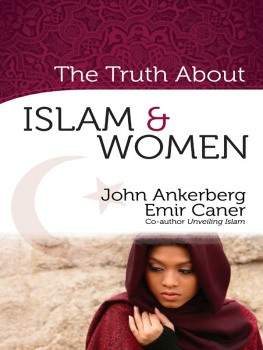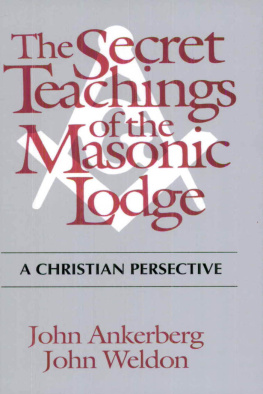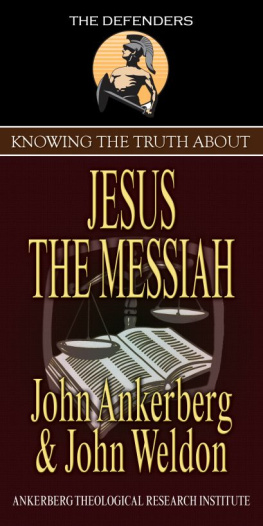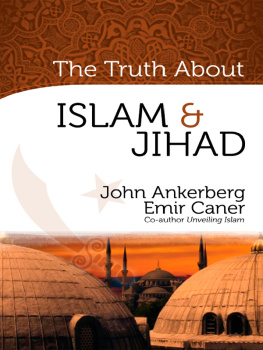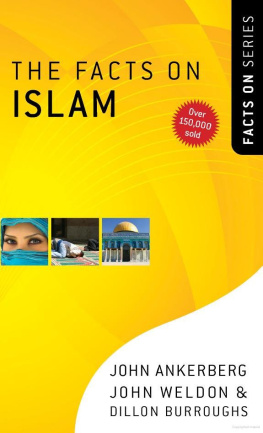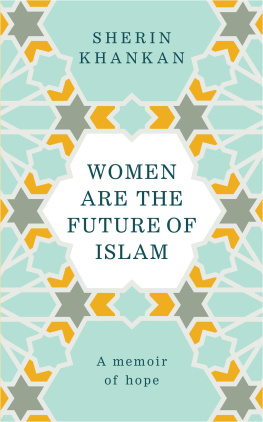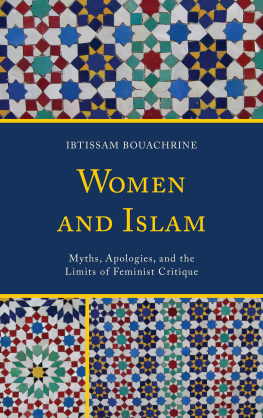

HARVEST HOUSE PUBLISHERS
EUGENE, OREGON
Unless otherwise indicated, all Scripture quotations are taken from the HOLY BIBLE, NEW INTERNATIONAL VERSION. NIV. Copyright1973, 1978, 1984 by the International Bible Society. Used by permission of Zondervan. All rights reserved.
Verses marked NASB are taken from the New American Standard Bible, 1960, 1962, 1963, 1968, 1971, 1972, 1973, 1975, 1977, 1995 by The Lockman Foundation. Used by permission. (www.Lockman.org)
All emphasis (italics) in Scripture quotations has been added by the authors.
Cover by Dugan Design Group, Bloomington, Minnesota
Cover photos Roberto A. Sanchez / iStockphoto; StockXpert
THE TRUTH ABOUT ISLAM AND WOMEN
The Truth About Islam Series
Copyright 2009 by John Ankerberg and Emir Caner
Published by Harvest House Publishers
Eugene, Oregon 97402
www.harvesthousepublishers.com
Library of Congress Cataloging-in-Publication Data
Ankerberg, John, 1945-
The truth about Islam and women / John Ankerberg and Emir Caner.
p. cm.
Includes bibliographical references.
ISBN 978-0-7369-2503-7 (pbk.)
1. Women in Islam. 2. IslamControversial literature. 3. Apologetics. 4 Christianity and other religionsIslam. 5. IslamRelationsChristianity. I. Caner, Emir Fethi. II. Title.
BP173.4.A54 2009
297.082dc22
2008038178
All rights reserved. No part of this publication may be reproduced, stored in a retrieval system, or transmitted in any form or by any meanselectronic, mechanical, digital, photocopy, recording, or any otherexcept for brief quotations in printed reviews, without the prior permission of the publisher.
Contents
On a hot July summer morning, Omar and Aisha rush to the local hospital in Damascus, Syria, in eager anticipation of the birth of their first child. Dreaming of this day for years, they were preparing long before Aisha ever found out she was with child. As is common for many Muslim women, Aisha prayed to Allah about her desires to be a mother while repeatedly reciting sura 103 ( Al-Asr , the Declining Day) and sura 112 ( Al-Ikhlas , Sincerity).
Omar, too, frequently recited sura 12 ( Yusuf , Joseph) in hope that Allah would give them a beautiful child. After notification of her pregnancy, Aisha sought to perform good works, repented of prior sins ( taubat ), and prayed during the early hours of the day, three activities many Muslims believe are necessary in order to have healthy children. During her prenatal period, Aisha nourished her unborn child with halal (permitted) food. Muhammad once explained, If a woman eats sweet melon, she will give birth to a handsome and pretty child. These two devout Muslims diligently followed Islamic customs, hoping that Allah will bless their family with many children.
Then, a baby girl is born. This beautiful, brown-eyed, seven-pound-nine-ounce infant has entered the world of Islam, a world intended to be a cradle-to-the-grave religion in which there are no irreligious acts. Immediately, her father whispers into her right ear Allahu Akbar (God is Great), an act intended to protect the little one from the wiles of Satan. He proceeds to whisper the rest of the call to prayer in her left ear.
The baby is brought home as the excited young parents gleefully relate the news to their friends and family. On the seventh day after her birth, Omar sacrifices an animal ( aqiqah ) in proper manner. He ensures Today, the joy of new creation is celebrated by the entire community that surrounds this little one.
In submitting herself to Allah and doing what is right according to the Quran, she hopes that one day Allah will be pleased and grant her Paradise.
Aminas life will be much like her birth. Her devoted Muslim parents will strictly follow the dictates of the Quran and the Sunnah (the example of Muhammad She will learn about the Seal of the Prophets (sura 33:40), Muhammad, and Muhammads daughter Fatima.
In addition, she will be taught what to say when she wakes up in the morning, how to greet those along the way, and how to pray five times daily. Modesty will be her life lesson, from the way she dresses to her demeanor in public. The Quran will stipulate her rights in life, marriage, and work, with the ultimate goal that she herself will one day take on the greatest task she can have in this lifemotherhood. In submitting herself to Allah and doing what is right according to the Quran, she hopes that one day Allah will be pleased and grant her Paradise.
Come and explore the fate of the women of Islam, a journey tens of millions of women have taken during the past 14 centuries. From birth to death, from creation to eternity, from family to society, walk the path of Islam and its impact on women. Along the way, you will not only gain an understanding of Islam, you will also see the stark differences between the values of Islam and of Christianity.
The Truth About Islam and Women gives the essentials of what the second-largest religion in the world declares about the female sex. But dont simply study the facts. Understand the repercussions these beliefs have on the lives of countless female babies born at local hospitals around the Muslim world each day, including many born today in North America. And remember, for us it is a studyfor women born into Islam, it is life.
Though many of the Arabic words used in this book are described in their context, a few foundational terms are noted here to help explain what you may encounter in these pages. The version of the Quran used in this book, unless otherwise indicated, is the translation of Yusuf Ali, considered one of the most authoritative versions among English-speaking Muslims.
Bukhari : Named after its compiler, this Hadith (tradition) is the most respected compilation of Muhammads words and deeds, also known as the Sunna .
Dawud : One of the six collections of the words and deeds of Muhammad, this collection of traditions, or reports (ahadith) focuses on law.
Caliph (also calif ): The title of Islamic leaders after Muhammads death. Among the Shiites, caliphs have been replaced by imams .
Five Pillars : The five foundational spiritual practices in Islam required of all Muslims in order to enter Paradise (see question 11).
Hadith : Story: collection of sayings and examples of Muhammad; highest Islamic authority after the Quran.
Hajj : One of the five pillars of Islam, which commands all Muslims able to do so to visit the Muslim holy site in Mecca at least once during their lifetime.
Imam : A Muslim holy leader, usually in charge of a local mosque. In Shiite Islam, a supreme spiritual guide who is a direct descendant of Ali, and thus Muhammad.
Jihad : An Arabic term for resistance, interpreted as a spiritual struggle or as an external struggle (violence and war).
Mecca : Islams most holy site, which all able Muslims must visit at least once during their lifetime.
Mosque : A building in which Muslims hold prayers and worship activities.
Muslim : One of the most respected ( sahih ) compilations of the words and deeds of Muhammad, this collection, named for its compiler, contains about 4000 traditions ( ahadith ).
Quran : The holy book of Muslims, said to contain, word for word, the instruction Allah gave to Muhammad, the founder of Islam.
Shia : Literally, faction. Shiite has come to mean a follower of Alione who believes the caliph Ali was the true successor to Muhammad.
Sunni : People of the Way. Followers of Abu Bakr and Umar, the first two caliphs, as successors to Muhammad.
Next page
